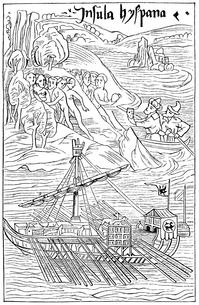September 20, 2013
Room 1210 Heller Hall
12:15 p.m.

The arrival of the Castilian caravels in 1492 on the coast and islands which at first sight were identified as the Orient and the resulting encounters with the first natives oddly coincides with the end of the so called "coexistence of the three cultures" in the kingdoms of the Iberian Peninsula. Contemporary Christian Castilians set aside their Jewish and their Morisco others to engage with "new others" in unchartered territories, where concepts like conversion, conquista and cohabitation evolved and were adapted to new contexts. This moment is often considered a symbolic turning point between the Middle Ages and Modernity.
In his talk, Dr. Martinez will focus on the traditions of othering in the early modern Iberian Atlantic World, paying special attention to the European perceptions of the natives of the "New World" through chronicles and travel narratives.
Pedro Martínez García is a lecturer in the Chair of Early modern History, University of Bayreuth, Germany.
Since 2008, he has been writing his dissertation entitled "Face to Face with the Other: Travel Narratives and Alterity from the Late Middle Ages to the Early Modern Period"
at the University of Valladolid (Spain) and the University of Bayreuth (Germany).
Sponsored by: Center for Holocaust and Genocides Studies, Center for Early Modern History, Department of Spanish and Portuguese.